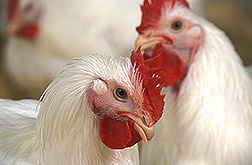This page has been archived and is being provided for reference purposes only. The page is no longer being updated, and therefore, links on the page may be invalid.
Better, Faster Vaccinations for Poultry
By Alfredo FloresDecember 20, 2005
Egg producers now have access to a new tool developed by the Agricultural Research Service (ARS) that helps protect laying flocks from serious diseases like infectious bronchitis, mycoplasmosis and exotic Newcastle disease. Each year, mycoplasmosis alone costs U.S. producers more than $140 million, partly due to uneven vaccine delivery.
Vaccines are currently dispensed to egg-laying leghorn chickens as an inhalable mist sprayed inside poultry houses. The applicator consists of a hose attached to a machine inside a backpack that resembles a modified leaf blower. The machine makes an ear-piercing noise that disturbs the birds, while the vaccine spray reaches its intended targets only about half the time.
Now, a more effective vaccinator has been developed by ARS researchers in the Poultry Research Unit at Mississippi State, Miss., under the leadership of supervisory veterinary medical officer Scott Branton. Named for Martin Carden, John Prisock and Jason Johnson, the CPJ Vaccinator is a battery-powered, 6-foot-tall by 5-foot-long device with nozzles on both sides that quietly spread the vaccine to three tiers of birds at once without disturbing them. The vaccine is dispensed so uniformly that it reaches more than 90 percent of the birds to be treated. Branton modified the device to meet industry standards.
Field trials at the Cal-Maine Foods, Inc., egg-production facility in Edwards, Miss., showed the CPJ Vaccinator to be efficient, effective and easy to use. With it, one person was able to vaccinate roughly 75,000 chickens in about seven minutes, compared to five people taking 45 minutes to get the job done conventionally.
A manufacturer for the CPJ Vaccinator has been found, and the device is now commercially available through the Long Branch Company, Inc. of West Point, Miss.
ARS is the U.S. Department of Agriculture's chief scientific research agency.


